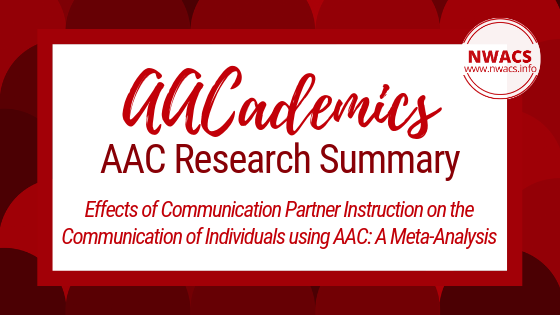by Julia Wynne, MA, CCC-SLP (Speech-Language Pathologist); NWACS Contributor
As many of us know, communication with individuals who use Augmentative and Alternative Communication is complex. Teaching communication partners how to interact and communicate with AAC learners and users is an integral component of the learning process. Typical interaction patterns exhibited by individuals with complex communication needs include few turns, initiating and responding infrequently, and asking few questions. These patterns lead to the communication partner taking the majority of turns and asking A LOT of yes/no questions. The AAC user or learner, in turn, has fewer opportunities to communicate. Fortunately, many studies have reported success with communication partner instruction across the lifespan with a variety of communication partners.
Meta-analyses play a fundamental role in the world of healthcare to support evidence-based practice. This research design combines the results and data from multiple studies. It is beneficial for summarizing the results of a large number of studies involving a particular intervention or therapy strategy to tell whether that method is effective. This meta-analysis looks at the very important topic of the training communication partners to interact effectively with complex communicators.
I will start by explaining some key terms, then share the research question and why this information is essential to know. I will follow that with the authors’ conclusions and some critical takeaways so that we can apply this research to teaching our AAC learners. Away we go!
Aided Communication System: use of tools or equipment in addition to the user's body to communicate
Communication Partner: individuals in the environment with whom the AAC user may interact
Complex Communication Needs: refers to people with severe speech, language and communication impairments
High Tech: devices that require batteries and can provide computer-based voice output
Low Tech: symbol system that does not use a battery
Meta-Analysis: is a study that combines the results and data from many studies.
Pragmatic: use of appropriate communication in social situations
No Tech: communication through the body only
Semantic: word, phrase, and sentence meaning
Syntactic: sentence structure and grammar
Voice Output: any device whose main function is to use output speech as a means of communication
The question asked in the article is: What are the overall effects of partner instruction interventions on the communication of individuals using AAC?
Let’s explore what this research means to us!
For most people with complex communication needs, learning to use AAC is not easy or intuitive. Similarly, knowing how to facilitate interactions with these individuals does not come naturally for the communication partners of these complex learners. Often, the need for an effective communication partner is not considered in the assessment and intervention process for AAC. Communication partners can include peers, family members, educators, and other professionals. Fortunately, despite these difficulties, communication partner instruction, which involves teaching partners how to set up contexts and opportunities for communication, provide AAC models, and ask questions, has proven to be successful and necessary.
This study analyzed the results of seventeen single-case design studies, which included 53 individuals with complex communication needs. These individuals use a variety of high-tech, low-tech, and no-tech aided communication systems with and without voice output. Results of the meta-analysis indicate that communication partner instruction has positive effects on the communication skills of individuals who use AAC. The impact of the intervention was most evident in the improvement of semantic and syntactic measures and less apparent in studies that measured pragmatic language skills.
Two types of intervention were analyzed: strategy instruction and skill-based instruction. Strategy instruction is when the partners are taught to use a series of communication skills in a multi-step sequence. Skill training involves teaching partners to use specific communication skills. Training occurred in a variety of ways including providing a description of skills and reasoning/benefits of those strategies, instructor models, verbal rehearsal of sequential skills, opportunities for the communication partner to practice targeted skills or strategies in role-playing situations, guided practice opportunities with the individual using AAC, and/or materials-focused instruction (e.g., workbook).
Communication partner instruction should be viewed as an integral part of AAC assessment and intervention. This instruction should be provided routinely to improve communication outcomes for these complex learners. Communication partner instruction can be effective across different communication partners (e.g., caregivers, educational assistants, parents, peers, and teachers). Both types of intervention (strategy and skill-based) were determined to be effective ways to teach these skills to communication partners. In recent years, there has been more attention paid to training communication partners. However, a need still exists to look at the effectiveness of working with a broader range of communication partners, which will, in turn, expand the number of communication contexts in which the AAC user will participate (academic, vocational, social, etc.).
Please comment with any thoughts or questions!
Full article link: https://doi.org/10.3109/07434618.2015.1052153
Images include Boardmaker PCS. The Picture Communication Symbols ©1981–2018 by Mayer-Johnson LLC. All Rights Reserved Worldwide. Used with permission.
References
Kent-Walsh, J., Murza, K. A., Malani, M. D., & Binger, C. (2015). Effects of communication partner instruction on the communication of individuals using AAC: A meta-analysis. Augmentative and Alternative Communication, 31, 271–284.
You can read other posts about research HERE







